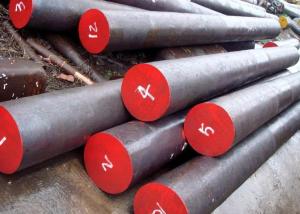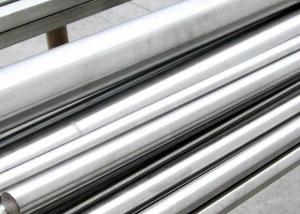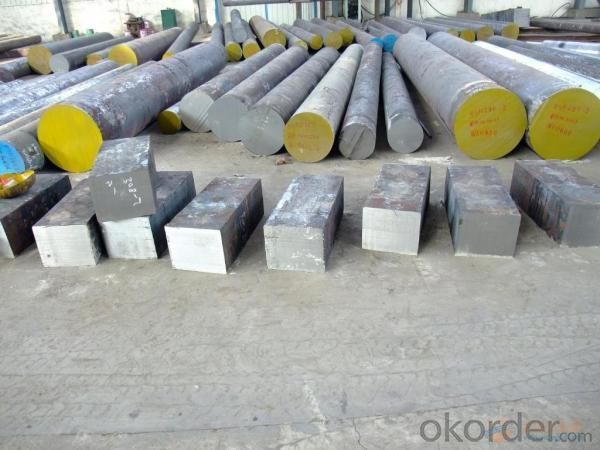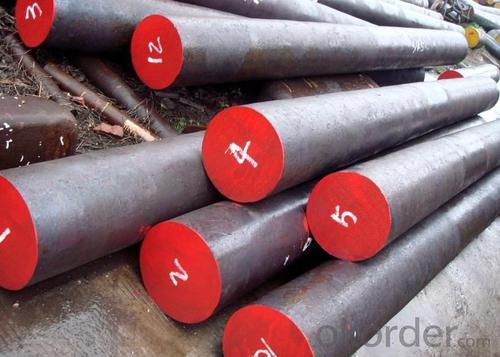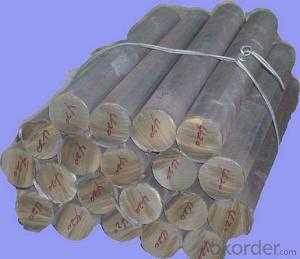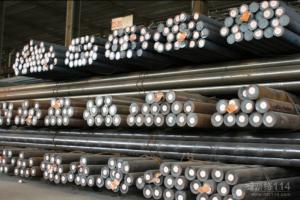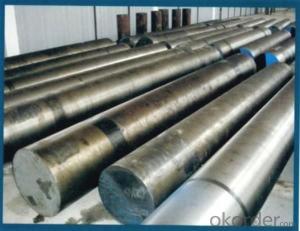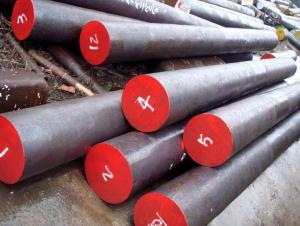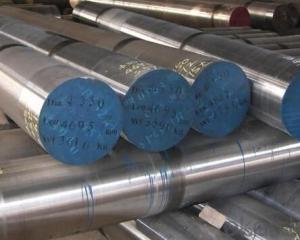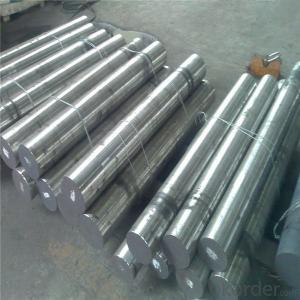Special Steel For Bearing
- Loading Port:
- Guangzhou
- Payment Terms:
- TT or LC
- Min Order Qty:
- 25MT m.t.
- Supply Capability:
- 600000 Tons/Year m.t./month
OKorder Service Pledge
OKorder Financial Service
You Might Also Like
Specifications of Special Steel For Bearing
|
Standard |
AISI, ASTM, BS, DIN, GB, JIS |
|
Dimension |
Diameter: 50mm-500mm Length: 2000-5800mm |
|
Grade |
GCr15, SAE 52100, L3, 1.2067/100Cr6 |
|
Surface treatment |
Black/machined/turned/polished |
|
Technology |
EF/ESR/EAF+VD+LF |
|
Inspection |
100% UT According to En1921D/d |
|
Certificate |
ISO9001: 2008 |
Main Markets: North America, South America, Eastern Europe, Southeast Asia, Africa, Oceania, Mid East, Eastern Asia, Central America, Northern Europe, Southern Europe
Chemical Composition:
China GB, GCr15: C: 0.95-1.05; Si: 0.15-0.35; Mn: 0.25-0.45; Cr: 1.40-1.65
USA AISI, L3: C: 1; Si: 0.50; Mn: 0.25-0.50; Cr: 1.10-1.70
German DIN, 1.2067: C: 0.95-1.10; Si: 0.15-0.35; Mn: 0.25-0.40; Cr: 1.40-1.70
France NF, 100Cr6: C: 0.95-1.10; Si: 0.10-0.35; Mn: 0.20-0.40; Cr: 1.35-1.60
Usage and Applications of Special Steel For Bearing
Wire drawing die/ Heading die
High Quality Bearing steel is used for manufacturing ball, roller bearing steel and rings. Bearing in work is under great pressure and friction, so have high demands bearing steel and hardness and resistance, and high elastic limit.
Bearing steels are used for ball and roller bearing applications and are comprised of low carbon steels and high carbon through harden able steel.
For example, bearing ring, steel rolling mill, machinery, 100Cr6 bearing steel ball is widely used in high-speed and low-noise bearing, bicycle, motorcycle, automobile, bags electronically.
Packaging & Delivery of Special Steel For Bearing
Packaging Detail: Standard seaworthy packing or as customer required.
Delivery Detail: 45 days
Trade terms: FOB, CFR, CIF
MOQ: 25 tons or at customer's demands
Shape of Special Steel For Bearing
Round bar/Flat sheet/steel flat
1. Round: forged steel, rolled steel, drawing steel, polishing steel
2. Abnormal shape: quadrilateral steel, hexagons steel
3. Flat steel
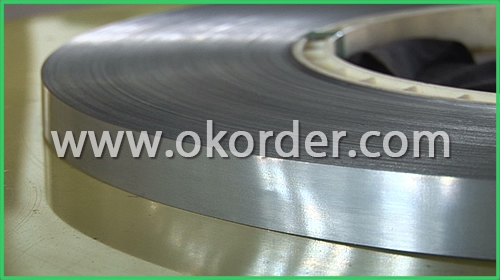
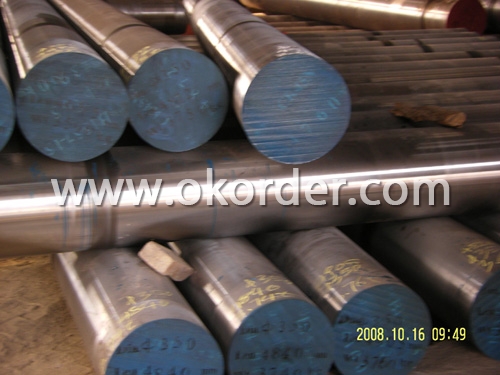

Other Size of Special Steel for Bearing
|
Round |
Diameter |
Length | |
|
50mm-500mm |
2000mm-5800mm | ||
|
Steel plate |
Thickness |
Width |
Length |
|
20-400mm |
80-1000mm |
2000mm-5800mm | |
Characteristics of Special Steel for Bearing
1. High carbon bearing steel
2. High strength and abrasion resistance
3. Low alloy and high fatigue property
4. With strong technical force, better reliability, high quality, competitive price, fast leading time and excellent after-sales service, we have gained a good reputation from our customers.
Quality Assurance of Special Steel for Bearing
We are the ISO 9001:2008 authentication enterprises and we can provide the enterprise's quality written guarantee for all the exported products.
Certificate of quality is issued in English, in addition the normal terms, production process, the mechanical property (yield strength, tensile strength, elongation and hardness. forged ratio, UT test result, Grain size, heat treatment methods and the sample of is shown on the certificate of quality.
Management Certification: ISO 9001:2000, QS-9000, ISO 14001:2004
- Q: How does special steel perform under high-temperature oxidation?
- Special steel is specifically designed to have excellent performance under high-temperature oxidation. It is made using alloys that contain a high amount of chromium, which forms a protective layer of chromium oxide on the surface of the steel when exposed to high temperatures. This chromium oxide layer acts as a barrier, preventing further oxidation of the steel and protecting it from corrosion. The high chromium content in special steel also enhances its resistance to scaling, which is the formation of thick oxide layers on the surface of the steel. Scaling can weaken the steel and lead to its failure under high-temperature conditions. However, special steel maintains its structural integrity even at elevated temperatures due to its ability to resist scaling. In addition to chromium, special steel may also contain other alloying elements such as nickel, molybdenum, and vanadium. These elements contribute to the steel's high-temperature oxidation resistance by further enhancing the formation and stability of the protective oxide layer. Overall, special steel performs exceptionally well under high-temperature oxidation conditions. Its unique composition and alloying elements allow it to form a protective oxide layer, resist scaling, and maintain its strength and integrity even at elevated temperatures. Thus, it is widely used in various industries where high-temperature applications are involved, such as power generation, aerospace, and petrochemical industries.
- Q: Does special steel require special machining techniques?
- Yes, special steel often requires special machining techniques due to its unique properties and characteristics. Special steels can have higher hardness, greater strength, improved corrosion resistance, or other desirable attributes that make them more challenging to machine compared to regular steels. Specialized cutting tools, machining parameters, and techniques may be necessary to achieve the desired precision, surface finish, and dimensional accuracy during the machining process.
- Q: Can special steel be used in the production of precision instruments?
- Yes, special steel can be used in the production of precision instruments. Special steel, known for its high strength, corrosion resistance, and heat resistance, provides the necessary durability and stability required for precise measurements and operations in precision instruments.
- Q: What is the impact of manganese in special steel alloys?
- The presence of manganese in special steel alloys is crucial as it greatly affects their properties and performance. These alloys, also referred to as high-strength or low-alloy steels, are specifically designed to possess improved mechanical properties, including increased strength, durability, and resistance to wear and corrosion. In order to achieve these desired characteristics, manganese, along with other alloying elements such as nickel, chromium, and molybdenum, is incorporated into the steel. One of the major impacts of manganese in special steel alloys lies in its capacity to enhance the hardenability of the steel. During the solidification and cooling process, manganese promotes the formation of fine-grained structures, which ultimately leads to improved strength and toughness. This particular property is of utmost importance in applications where the steel needs to endure heavy loads, shocks, or extreme temperatures. Moreover, manganese aids in reducing the brittleness of the steel and improving its weldability. By forming a solid solution with iron, it prevents the formation of detrimental iron sulfides, which can cause brittleness and hinder the steel's weldability. Consequently, manganese becomes an essential element in steels utilized in various industries such as fabrication, construction, and automotive, where welding is a common practice. In addition, manganese contributes to the steel's resistance against corrosion and oxidation. It creates a protective oxide layer on the surface of the steel, effectively preventing the intrusion of oxygen and moisture. This particular property proves to be highly advantageous in industries where the steel is exposed to harsh environments or corrosive substances, such as marine applications, chemical processing plants, or oil and gas refineries. Furthermore, manganese enhances the hardenability and wear resistance of the steel, making it suitable for the production of tools, machinery parts, and cutting edges. It heightens the steel's ability to undergo heat treatment, thus enabling the attainment of desired hardness and strength through processes like quenching and tempering. In conclusion, the inclusion of manganese in special steel alloys significantly enhances their hardenability, weldability, toughness, corrosion resistance, and wear resistance. Its addition enables the production of high-strength and durable materials capable of withstanding demanding applications and environments.
- Q: How does special steel contribute to the energy aftermarket industry?
- Special steel plays a crucial role in the energy aftermarket industry by providing high-quality and durable materials that are essential for the production and maintenance of various energy equipment and infrastructure. Firstly, special steel is widely used in the manufacturing of turbine components such as blades, rotors, and casings. These components are vital in power generation, particularly in thermal, hydro, and wind energy systems. Special steel offers excellent strength, corrosion resistance, and high-temperature stability, ensuring the efficient and reliable operation of turbines in harsh environments. Moreover, special steel is essential for the construction and maintenance of oil and gas pipelines. These pipelines are responsible for transporting energy resources across vast distances, and they require materials that can withstand extreme pressures, temperatures, and corrosive environments. Special steel grades with enhanced mechanical properties and resistance to corrosion are employed to ensure the integrity and safety of these pipelines, contributing to the overall efficiency and reliability of the energy aftermarket industry. Furthermore, special steel is utilized in the production of storage tanks, heat exchangers, and various other components used in the oil, gas, and renewable energy sectors. These components are crucial for storing and processing energy resources, and they require materials that can withstand high pressures, temperature fluctuations, and aggressive chemicals. Special steel grades provide the necessary mechanical properties and corrosion resistance, allowing for safe and efficient energy storage and processing. In addition to its material properties, special steel also enables advanced manufacturing techniques such as precision machining and welding, which are essential for producing complex energy equipment and components. These techniques ensure high accuracy, reliability, and efficiency in the production process, resulting in high-quality end products that meet the demanding requirements of the energy aftermarket industry. Overall, special steel contributes significantly to the energy aftermarket industry by providing materials that offer exceptional strength, corrosion resistance, and high-temperature stability. Its use in the manufacturing and maintenance of energy equipment and infrastructure enhances efficiency, reliability, and safety, ultimately supporting the growth and sustainability of the industry.
- Q: How are tungsten alloys used in the defense industry?
- Tungsten alloys are utilized in the defense industry due to their exceptional strength, density, and high melting point. These alloys are commonly used in armor-piercing projectiles, as well as in the manufacturing of armor plates and shields for military vehicles and aircraft. Furthermore, tungsten alloys are employed in the production of various defense components, such as munitions, missile parts, and penetrators, due to their ability to withstand extreme conditions and offer superior performance in critical defense applications.
- Q: How is stainless steel used in the production of kitchen utensils?
- Stainless steel is commonly used in the production of kitchen utensils due to its durability, resistance to corrosion, and easy maintenance. It is used to make a wide range of utensils such as knives, spoons, forks, and pots. The stainless steel material ensures that the utensils remain rust-free, food-safe, and long-lasting, making it ideal for daily cooking and food preparation.
- Q: How is maraging steel used in the production of aerospace components?
- Maraging steel is commonly used in the production of aerospace components due to its desirable properties such as high strength, toughness, and resistance to corrosion. It is used to manufacture various parts including landing gears, rocket motor casings, and turbine discs. Its unique combination of strength and ductility allows for the production of lightweight and durable components, ultimately enhancing the overall performance and safety of aerospace systems.
- Q: What is the cost of special steel compared to other materials?
- The cost of special steel compared to other materials can vary depending on a range of factors. Special steel, also known as alloy steel or tool steel, is typically more expensive than regular carbon steel due to its enhanced properties and composition. Its high strength, durability, and resistance to wear and corrosion make it suitable for specialized applications in industries such as automotive, aerospace, and construction. Compared to non-ferrous metals like aluminum or copper, special steel often comes at a lower cost. However, it is important to consider that different types of special steel can have varying price points. For instance, stainless steel, which contains chromium and other elements for enhanced corrosion resistance, tends to be more expensive than carbon steel. When comparing the cost of special steel with other materials such as plastics or composites, it is crucial to evaluate the specific requirements of the project. While these alternatives might have lower initial costs, they may not possess the same level of strength, heat resistance, or durability as special steel. Therefore, the long-term benefits and savings provided by special steel, such as reduced maintenance, longer lifespan, and improved performance, should also be taken into account. Ultimately, the cost of special steel compared to other materials is influenced by factors like the type and grade of steel, market demand, quantity needed, and any additional processing or finishing required. Consulting with suppliers, considering the specific application requirements, and conducting a thorough cost-benefit analysis will help determine the most suitable and cost-effective material choice for a particular project.
- Q: What are the different testing methods for special steel?
- To ensure the quality and performance of special steel, there are various testing methods commonly used. These methods encompass: 1. Chemical Analysis: Determining the steel's chemical composition, including elements and impurities, is crucial. It confirms adherence to specific chemical composition requirements. 2. Mechanical Testing: Evaluating mechanical properties like strength, ductility, hardness, and toughness is achieved through tests such as tensile, impact, hardness, and fatigue testing. 3. Microstructure Analysis: Assessing the steel's internal structure, grain size, and shape requires microscopic examination. Techniques like optical and electron microscopy, as well as X-ray diffraction, help identify any defects or abnormalities. 4. Non-Destructive Testing (NDT): Inspecting the steel without causing damage is possible through NDT methods. These include ultrasonic, magnetic particle, liquid penetrant, and radiographic testing to detect surface and subsurface defects. 5. Corrosion Testing: In applications where corrosion resistance is vital, various methods like salt spray, electrochemical, and immersion testing are employed. They evaluate the steel's resistance and corrosion rate. 6. Metallography: Preparing a cross-section of the steel sample, polishing it, and etching it reveals its microstructure. This aids in assessing quality, heat treatment effects, and grain size distribution. 7. Dimensional and Surface Inspection: Ensuring the steel meets required dimensional tolerances and surface quality is crucial. Techniques like dimensional measurement, surface roughness measurement, and visual inspection verify conformity. By implementing these testing methods, manufacturers and quality control personnel ensure that special steel meets the necessary standards, specifications, and customer requirements.
1. Manufacturer Overview
| Location | Guangdong, China |
| Year Established | 2005 |
| Annual Output Value | Above US$ 100 Million |
| Main Markets | korea, India, Malaysia, Brazil, Germany, Belgium, Middle East |
| Company Certifications |
2. Manufacturer Certificates
| a) Certification Name | |
| Range | |
| Reference | |
| Validity Period |
3. Manufacturer Capability
| a) Trade Capacity | |
| Nearest Port | Guangzhou |
| Export Percentage | 50%-80% |
| No.of Employees in Trade Department | 21-100 People |
| Language Spoken: | English; Chinese |
| b) Factory Information | |
| Factory Size: | 23,000 square meters |
| No. of Production Lines | 1 |
| Contract Manufacturing | OEM servise offered |
| Product Price Range | high; average |
Send your message to us
Special Steel For Bearing
- Loading Port:
- Guangzhou
- Payment Terms:
- TT or LC
- Min Order Qty:
- 25MT m.t.
- Supply Capability:
- 600000 Tons/Year m.t./month
OKorder Service Pledge
OKorder Financial Service
Similar products
Hot products
Hot Searches
Related keywords
